Sunday was Whit Sunday or Pentecost when we celebrate the gift of the Holy Spirit to the Apostles on the seventh Sunday after Easter. Red is the liturgical colour for this festival and here it symbolises the appearance of the Holy Spirit in tongues of fire described in the Bible as descending on to the Apostles’ heads.
The Bible then describes the Apostles as speaking in tongues. Now Pentecostalists and some evangelical Christians take this literally which in extreme forms can seem to crowd out other more important Christian precepts. But for other Christians, Pentecost is a reminder that we should be open to understanding lives and cultures different from our own – both on a national and international level, but also domestically where tensions between generations or sexes can require calm wisdom and creative thinking just to keep channels of communication open. A mother of 4, I often felt the judgement of Solomon package should come as standard with the first baby, not some hard grafted, imperfectly grasped and part forgotten add on extra. It took me years to work out that if I gave one of my daughters a choice of clothes in the morning, she would get dressed perfectly happily, whereas if there was no choice, the dressing would not progress so smoothly. She just needed to feel she had a bit of control over her life, and I could go along with that – when I’d actually worked it out.
The photographs here show North Stoke Church’s red altar frontal. I have already blogged about the other 3 (for links, see below) and this is the last one. Like the others, this shows a very high standard of skill with the needle with fine, smooth goldwork and beautiful silk shading. Unlike the others, however, the background fabric is velvet rather than brocade. This is also in better condition than the other frontals, being the least used, only coming out for Pentecost.
There are some strange Whitsun traditions in England – quite a few of which seem to involve bread, cheese, or bread and cheese and Gloucestershire. Up North this time of year meant Whitsun Walks, a tradition whose hold is now tenuous and in many places has altogether disappeared. A friend in North Stoke, born and raised in Rotherham, reminisced how she and her friends would have party dresses made for Whitsun (and in her case her gran was a bit of a whizz with the needle and made her a duster coat as well!). Gloriously arrayed in dresses, coats and white gloves(!) they would then climb on to the newly cleaned and sprucely sheeted coal truck and parade through the town along with other similar trucks bearing other children or brass bands. She’s not yet 6o but suspects this tradition has lapsed or diminished to some sort of off the peg fair.
Interestingly, Onward Christian Soldiers began life as a hymn for a Whitsun Walk of 1865. Dashed off by the Rev. Sabine Baring-Gould (whose name and reputation always brings a smile to our lips), it was produced in a great hurry and put in the hands of local school children when literally hot off the press. A great folk song collector and prolific writer, one of his novels, ‘The Book of Were-Wolves, an account of a terrible superstition’ (1865), influenced Bran Stoker ‘s Dracula’. While a curate in Horbury in Yorkshire, he fell in love with a mill girl much younger than he. His family felt the difference in social class and the girl, Grace, was sent to York for 2 years to learn middle class mores and elocution. After such an apprenticeship it is a relief to hear that Grace was accepted by Sabine’s family, that they went on the have 15 healthy children and lived together happily until separated by death. George Bernard Shaw is said to have based ‘Pygmalion’ on their relationship, translating the Yorkshire mill lass into a cockney. (See the Wakefield Express article here.)
So after a bit of a Whit peregrination and the fine needlework of North Stoke’s altar frontals, I’m head down and on with the altar frontal for Ipsden which I hope to post about later in the week.

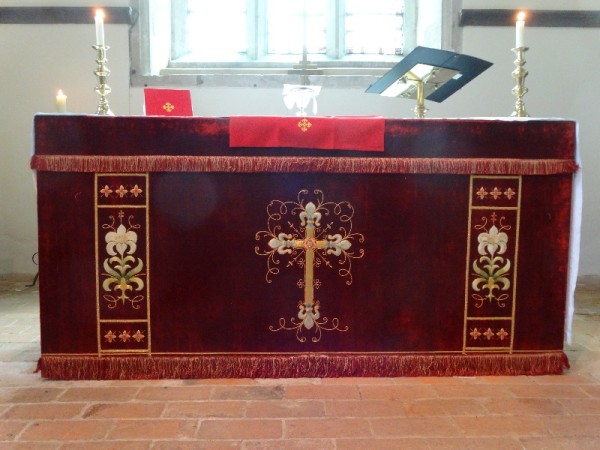
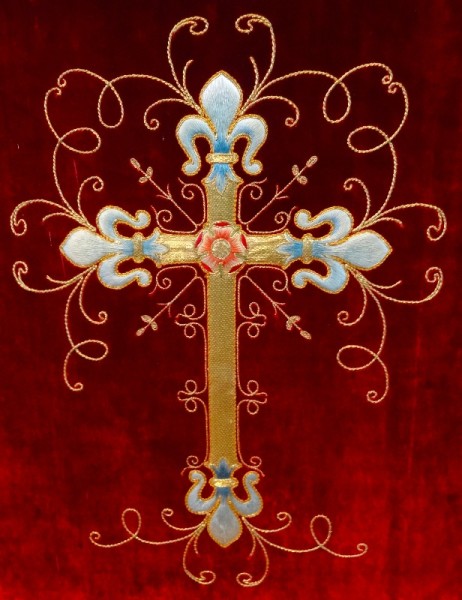
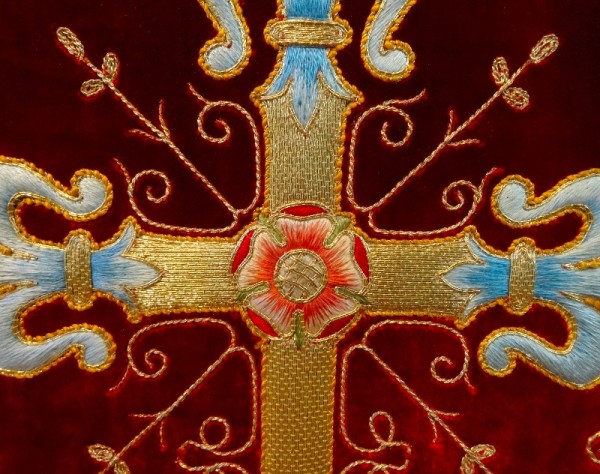
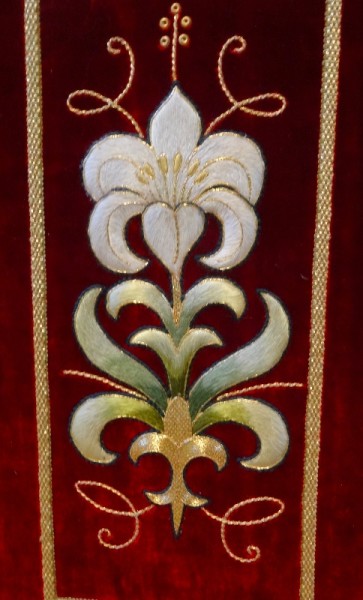
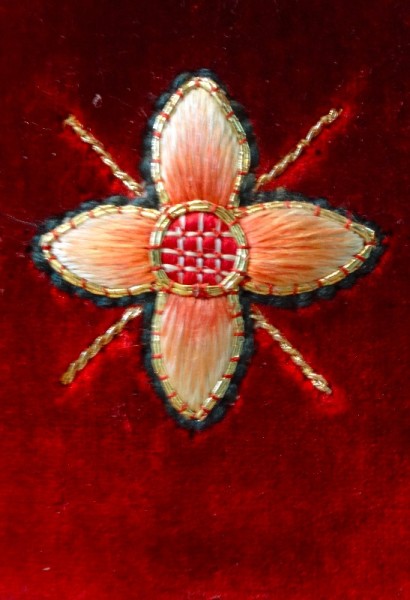
6 Comments
It’s a fabulous altar-frontal. I’d heard of Sabine Baring-Gould, but not much about his life. And besides, my flat mate when I was in France had a female schoolfriend called “Sabine”, so I wasn’t even sure of gender. After all, at that period “Hilary” was a man’s name, and I was at school with a girl called Hilary!
We had a German friend called Sabine (woman) and an English friend Hilary (man). Fortunately the latter was a larger than life character who carried the name off with such great aplomb that I could almost think it was a pretty ordinary sort of name for a man in spite of knowing quite a few women called Hilary.
I always thought (& was taught) that the Holy Spirit was given to the whole Church at Pentecost.
That is one magnificent altar frontal!
Well yes, of course, you’re right Sharon. I sometimes get carried away with my thoughts and omit the most important thing!
Such an interesting post Mary, I read the article in your link, and was rather moved by the Rev outliving his much younger wife by many years, I am sure they would not have anticipated this outcome when they married. The red alter frontal is very dramatic. X
Perhaps Grace Baring-Gould’s early mill life and the bearing of 15 children took its toll. The very thought of both these sets of experiences is enough to make me feel quite weary, vicariously.
Hope the foot is healing.M